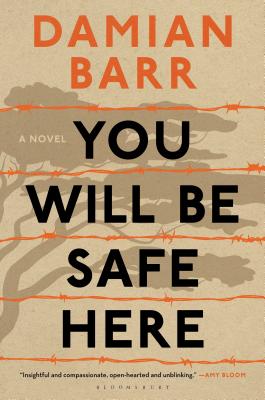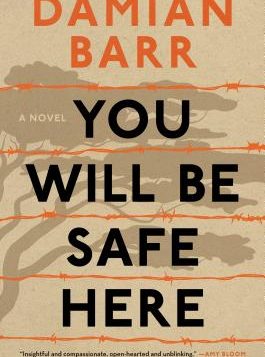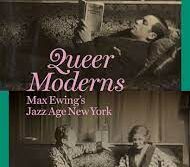 You Will Be Safe Here
You Will Be Safe Here
by Damian Barr
Bloomsbury Publishing. 352 pages, $27.
HOW DOES THE PAST ripple through to the present? In what ways do the actions of those who’ve lived long ago affect everyone alive today? You Will Be Safe Here is an examination of these themes. Taking place during the Boer War era of South Africa in 1901 and in modern Johannesburg circa 2010, the novel tracks multiple story lines that only converge and begin to make sense about halfway through the book.
Beginning with the diary entries of Sarah van der Watt, a member of a Boer (Afrikaans for “farmer”) family taken by force from their farm and sent by the British to a concentration camp, Sarah writes of her struggles as 250,000 British imperial forces are deployed to the Orange Free State and the Transvaal, whose forces numbered just 17,000 men. As the author points out in an afterward, the story of the Boer Wars is not taught in schools anymore. No one wants to revisit it. Once referred to as “the last gentleman’s war,” it was anything but. The author asserts that during the Boer War, not only did the British invent the scorched-earth policy, burning 30,000 farms, they also invented the concentration camp. Indeed, Hitler reportedly studied the actions of the British in that era, though these concentration camps were not designed as death camps. Nevertheless, more people died in them due to famine, disease, and other hardships than in the war itself. When the van der Watt family is placed there and told “You will be safe here,” the irony is unmistakable.
In modern Johannesburg, Willem, a sixteen-year-old gay-leaning male, is sent by his well-meaning parents to a camp meant to toughen him up and “make a man out of him,” in the words of his mother’s live-in boyfriend. Of course, he’s not safe there at all: the camp turns out to be a front for the ultra-right-wing New Dawn, where he is subjected to numerous tortures, both mental and physical. What’s revealed during his ordeal is not only the struggle of a gay man yearning to be free, but also the tensions of modern-day South Africa. Readers without some basic understanding of South Africa’s history may feel a bit at sea. Indeed the book might have benefited from a short glossary, since Afrikaans words are sprinkled throughout.
Nevertheless, You Will be Safe Here is a gripping tale, and its prose could hardly be sparer and smarter. Key plot points are revealed in apparently insignificant details, so the reader needs to pay close attention throughout to piece the story together. This technique proves to be both a strength and a limitation. The prose is as hard-edged as a gem and cuts as deep, but it leaves little room for emotion other than a profound sense of how brutal history can be. Most of all, it points out that history is a kind of umbilical that runs through time and has reverberations and implications not immediately apparent. At one point, the boy reflects that he is being sent to the camp because of a bullying incident at school that resulted in an accidental injury, the bullying itself the result of an earlier incident on a bus when he wet his pants because the bus driver was afraid to stop in a bad neighborhood.
You Will Be Safe Here is smart and well-written, but readers expecting a gay novel along the lines of Tatamkhulu Afrika’s Bitter Eden (another South African prisoner-of-war camp story, this one set during World War II and featuring a gay couple) will be disappointed. Instead, it is a remarkably effective novel about the historic tensions that have informed South Africa since its birth. The fact that one of the main characters is gay is just one among a number of tensions. Although there’s no real resolution or explanation for the cycle of events, no straight line of history from one event to the present, there is instead a very trenchant and sympathetic portrait of how man’s inhumanity to man churns and cycles through each era and erupts into the present.
Dale Boyer’s new book,Justin and the Magic Stone, will appear this fall.





